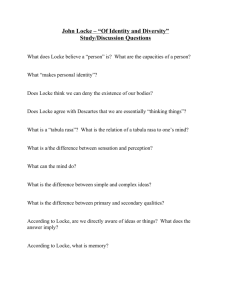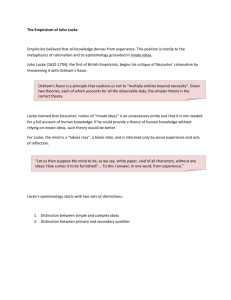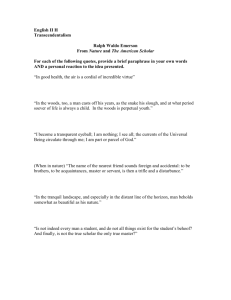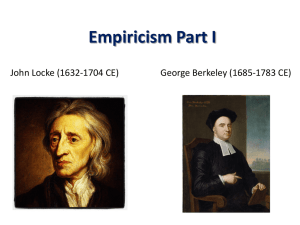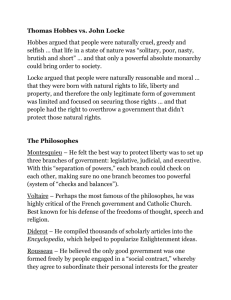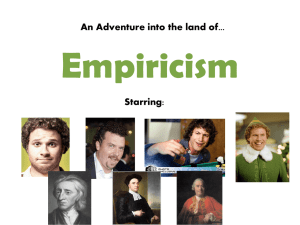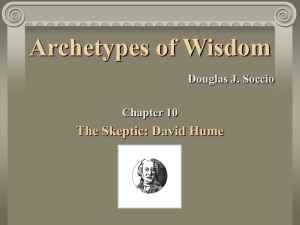Renaissance Thinkers, British Empiricism, Locke, and others
advertisement
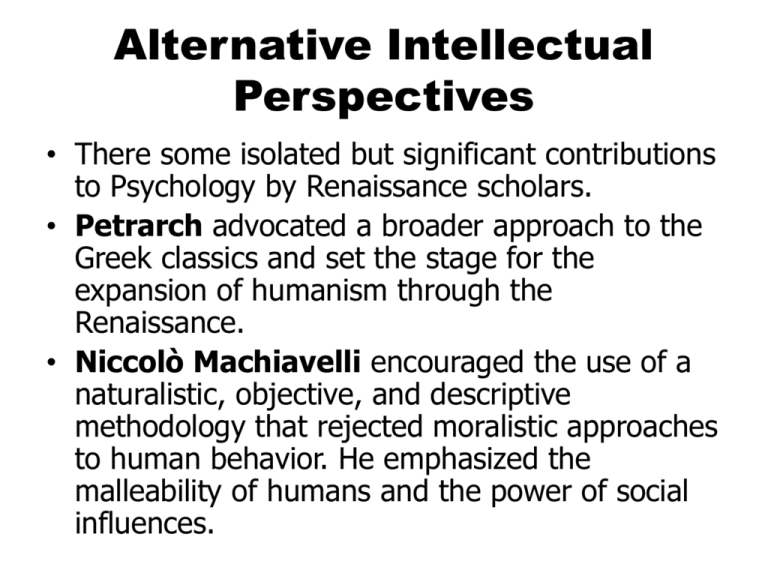
Alternative Intellectual Perspectives • There some isolated but significant contributions to Psychology by Renaissance scholars. • Petrarch advocated a broader approach to the Greek classics and set the stage for the expansion of humanism through the Renaissance. • Niccolò Machiavelli encouraged the use of a naturalistic, objective, and descriptive methodology that rejected moralistic approaches to human behavior. He emphasized the malleability of humans and the power of social influences. Alternative Intellectual Perspectives (continued) • As noted in your text, in terms of methodology and research interests, Juan Luis Vives may be viewed as the founder of modern psychology. • Juan Luis Vives described emotions objectively and in bodily terms. • He also argued for associationism in memory and for a broad and secular approach to education including education for women. • Leonardo da Vinci was a true Renaissance Person whose contributions to psychology include an accurate anatomy of the visual system, advances in understanding of visual perception, and descriptions of the variety of emotional facial expressions. Alternative Intellectual Perspectives (continued) • Paracelsus was an innovative chemist who applied his chemical knowledge to medicine. • He argued that mental processes may affect the health of the body and vice versa. • Paracelsus argued strongly for knowledge through experience instead of by authority. • Julius Caesar Scaliger was one of the first to study kinesthetic and muscle senses and the role of muscles in habit. • Michel de Montaigne was a Catholic with strong Protestant sympathies during the time of bloody conflict between these religions. He resurrected skepticism in his Apology for Raimond Sebond, a scathing, multifaceted attack on the arrogance of human knowledge. Alternative Intellectual Perspectives (continued) • Michel de Montaigne takes the reader through his personal explorations of psychological topics including thought, emotion, and motivation. More practically, he argued against the brutal child-rearing practices of his day. • He argued that experience is not pure, and he accurately described much of human behavior as inconsistent in terms of both conduct and opinion. • Olivia Sabuco examined the physical and psychological consequences of the passions, and even though she emphasized the importance of intellectual processes, she stressed the central role of emotions for humans. • Finally, Juan Huarte studied individual differences in aptitude and attributed these differences to the effects of the humors and the condition of the brain. British Empiricism • Empiricism – belief that knowledge is the result of experience. (no experience = no knowledge) • British empiricism – sensory experiences are the building-blocks of our knowledge. – For example, the color “orange” is your abstraction of your many experiences with orangish-colored-things Early Empiricists • William of Occam (1285 - 1349), an English Franciscan friar and major figure of medieval thought, set roots of empiricism with his belief that our knowledge of our world is entirely from sensory experiences. • Francis Bacon (1561 - 1626) – theories are “figments of the imagination.” Bacon wanted science to focus on the observations, and making generalizations of many observations, rather than testing theories. Francis Bacon • Bacon and a French contemporary, Rene Descartes (1596-1650), attempted to justify human knowledge through empiricism and rationalism. (We will cover Descartes later.) • Empiricism is closest to the term “experience.” Generally, empiricists argue for posteriori knowledge, a passive mind that responds to sensory input, and induction as a method of knowledge. • Francis Bacon focused on problems of human knowledge and was a pioneer in the development of the scientific method. Thomas Hobbes (1588-1679) • Founder of British empiricism • Worked for Francis Bacon, friends with Galileo and Descartes. • Hobbes was influenced by Galileo’s proposal that the universe was made entirely of matter and motion, and he believed people could also be explained in terms of matter and motion. • Concluded that the mind is sensory experience of matter and motion. John Locke (1632 – 1704) • The most influential British empiricist • Also had and interesting Life: – Son of a puritan – Studied and remained at Oxford for 30 years – Studied medicine and empirical philosophy later in life and finally received an M.D. in 1674 at the age of 42 John Locke • Locke’s thinking was influenced by Robert Boyles, a chemist who proved that physical objects are made of tiny particles. • Locke, in turn, concluded that our mental processes are composed of tiny “particles” of sensory experiences. • Objected to innate ideas, as proposed by Descartes. They are not based on experiences, and not everybody has them. John Locke’s Mental Model Sensation and Reflection • Ideas are products of either sensation or reflection Reflection refers to the mind’s ability to reflect on itself (upward movement) Sensation is the source of ideas (the starting point) Simple versus Complex Ideas Complex ideas are the composites of simple ideas. (made of many “atoms”) Simple ideas are the “atoms” of experience. (the starting point) Locke and Ideas • Once obtained, ideas can be arranged and rearranged by mental operations thereby creating new ideas through reflection. • Once in the mind, ideas can be transformed into other ideas. This is how Locke explains all thought processes, including perception, thinking, doubting, believing, knowing, and willing. • Note: he opposed specific “innate ideas” but not innate operations or faculties of the mind. Qualities of Thought Secondary Qualities – psychological in nature, have no worldly counterpart Primary Qualities – physical in nature, composed of the parts and the whole of our experiences Paradox of Basins • Is temperature a characteristic of the physical world? • Locke conducted an experiment to answer this question. • Take three basins – One containing cold water (A) – One containing hot water (B) – One containing warm water © • Place one hand in basin A and the other in basin B • The hand in A will feel cold, the hand in B hot This would make it appear that cold and hot are properties of water. Hence, temperature =primary quality • • • • • • • • Now place both hands in basin C (warm water). What would you experience? How did the hand that had been in cold water feel? HOT How about the hand that had been in hot water? COLD Why is this so? Temperature is a secondary, not a primary quality. Primary and Secondary Qualities • Refers to the power to produce ideas. • With primary qualities, there is a match between what is present in the physical world and what is experienced in the mind. • Secondary qualities do not correspond to anything in the physical world. – Required to produce notions such as color, sound, temperature Locke and Emotion • Feelings of pleasure or pain can accompany both simple and complex ideas • Other emotions (passions) such as love, desire, joy, hatred, sorrow, anger, fear, despair, envy, shame and hope are more complex derivatives of pleasure and pain Other Lockean Ideas • The mind can neither create nor destroy ideas, but it can arrange existing ideas into an infinite number of configurations. • Association of Ideas • Associationism takes association to be the fundamental principle of all mental life. • Note: Locke was not a pure associationist. • He believed most knowledge comes from actively reflecting on the ideas in the mind. John Locke’s Mental Model George Berkeley (1685-1753) • While Bacon and Locke applied empiricism to questions of epistemology, George Berkeley took an empirical approach to ontology. He challenged the materialism of Locke, and he advocated a return to spiritual interpretations of the world. • In his classic Three Dialogues Between Hylas and Philonous, Berkeley noted that we experience secondary qualities with the senses, and he also pointed out that we can only know primary qualities through the senses. If all we know about the world comes through experience, how can we speak of primary qualities outside of experience? George Berkeley (continued) • If all knowledge of the world comes through experience, humans cannot validate the existence of anything outside of experience. Therefore, for Berkeley, the only real world is the world of experience, and existence is defined as being perceived (“Esse est percipi”). • Berkeley’s critics asked how the world could be so consistent if nothing could be demonstrated to exist without a perceiver. Berkeley’s reply was that consistency implies a continual perceiver, God. Therefore, for Berkeley, the consistency of the world demonstrates that God must exist. George Berkeley (continued) • If, as Berkeley asserts, all I can know with certainty is my own experience, I may fall into solipsism, the belief that only selfknowledge is possible. • Berkeley addressed other psychological topics including vision and the relationship between vision and touch. David Hume (1711-1776) • David Hume agreed with Berkeley that experience is the primary subject matter of philosophy, but he maintained that our experience is simply a chain of events. We do not experience cause as a necessary connection residing outside the world of experience. • Causality and other relationships are only functions of our mental habits. • Hume distinguished between impressions, mental phenomena that present themselves with force (e.g., taste, color, sensations, and emotions), and ideas, fainter images of impressions. David Hume (continued) • Hume argued that our selves and our experiences are not as continuous as we would like to believe and that they may be more like a disjointed parade than a single, self-coherent system. • Hume studied the emotions extensively, and he advocated comparative studies in physical anatomy and “anatomy of the mind.” Associationism and Utilitarianism • Associationism and Utilitarianism were motivated by practical problems in education and society. • David Hartley, often regarded as the founder of modern associationism, classified the varieties of pleasure and pain and their effects on human motivation. • Hartley also proposed a neurophysiological system of association in which miniature vibrations (vibrantiuncles) remain after the initial stimulus has passed. • Vibrantiuncles become the basis of memory. • At the intersection of law and psychology, Jeremy Bentham attacked intuitive methods of dispensing justice and argued for a utilitarian approach to jurisprudence emphasizing the greatest good for the greatest number. • Bentham accepted psychological hedonism, the idea that humans seek pleasure and avoid pain; he debated whether pleasures and pains were quantifiable. • Mary Wollstonecraft, an early pioneer in the battle for the emancipation of women, suggested that the societal differences between the genders resulted from the lack of opportunities for women. • Wollstonecraft argued against essentialism, the belief that the essential nature of men is qualitatively different from the essential nature of women. The Mills: James and John Stuart • James Mill argued for a mechanistic approach to the mind based in association and conditioning, and he strongly advocated education for the masses. • John Stuart Mill, the son of James Mill, was a product of his father’s mechaniisitc approach to conditioning and education. • But, John Stuart Mill viewed the mind in probabilistic terms rather than mechanical terms. • He maintained that a science of psychology was possible, and he also suggested a science of the development of character, which he called etholog. • John Stuart Mill, perhaps due in part to his relationship with Harriet Taylor, advocated feminist views, and he grounded these views in his empiricism and his utilitarianism. He argued that we cannot know the capabilities of women until women are given the same opportunities as men, and he suggested that there would be societal benefits from providing women with opportunity.

